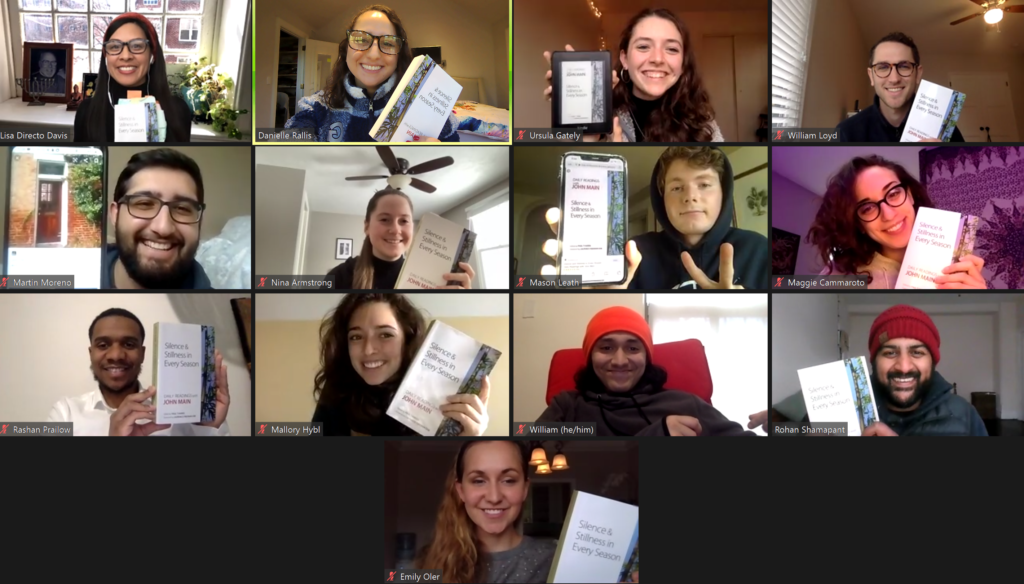Practicing Stillness, Silence and Simplicity in Virtual Community
At the John Main Center for Meditation and Interreligious Dialogue (JMC), we customarily offer two meditative readings as bookends to our silent mantra-based meditation. Echoing the tradition of the ancient Christian desert mothers and fathers, spiritual seekers, like us, retreated from the city and marketplace to receive ‘a word’ from these wisdom figures to help navigate the storms of the inner and public life.
Last spring, as we all withdrew from the energetic landscape of campus life into the simplified solitude of our cell-like squares on Zoom, this global pandemic exposed all levels of our personal frailties alongside societal ailments of racial and economic injustices. Evermore urgently, we sought means to restore, engage, redress and heal. Early on, Fr. Richard Rohr, O.F.M, founder of the Center for Action and Contemplation, spoke such ‘a word’:
We are in the midst of a highly teachable moment…We have a chance to go deep, and to go broad. Globally, we are in this together. Depth is being forced on us by great suffering, which as I like to say, always leads to great love.
Throughout each season since March 2020, the JMC quickly adapted to the community’s needs from meditating on campus in the refuge of the Anne Marie Becraft Hall, the McDonough School of Business and the Harris Building to offering 15-20 virtual meditations every week continuously and without break — a true testament to the steadfastness of the JMC practitioners and mostly students leaders who host these sessions.
As a diverse community of students, faculty, staff, alumni and JMC members beyond Georgetown, we experienced the solace of meditating together to allay the effects of “Zoom fatigue,” isolation, anxiety, and stress. Called upon to support community-building in these trying times, the JMC was invited to host and reach out to as many as twenty-five new cross-campus groups as a valuable resource. Like others hesitant to add yet another Zoom meeting, Rashan Prailow noticed the JMC online meditations actually strengthened his commitment to sharing this practice as a JMC leader at the MSB and helped create the new Black Hoya Meditation community:
Initially, I was worried that the virtual environment would negatively impact my experience and overall practice. Nevertheless, I decided to stick with my commitment and it has been the best decision I’ve made at Georgetown. The pandemic as well as social uprising across our country has caused a deep level of disturbance within me as a person and specifically as a black man. Thanks to my JMC virtual family…the impact on my personal and spiritual wellbeing during this time has been transformative.
In this spirit of hospitality, the JMC welcomes all participants to partake in post-meditation conversations as well as new affinity groups which provide a safe space for community. This contributes to a sense of belonging and purpose and reinforces the contemporary relevance of wisdom from the ancient Christian, Dharmic, and other contemplative traditions. Holding this crucial space for Cura Personalis, JMC participants also affirm that meditation has helped them stay mentally and spiritually grounded, deepened their dedication to the meditation practice, and allowed them to engage meaningfully in current events impacting their lives.
Long-time JMC student meditator and new JMC alumni leader, Ashton Garriott characterized the significance of the online presence as “finding stillness in the storm.” He further reflected:
…meditation has a unique way of allowing people to grapple with the uncertainty, discomfort, and turmoil this year has witnessed, from a global pandemic to a renewed movement for racial justice. Though meditation does not make that uncertainty go away, it allows those who practice to sit with it, breathe into it, and observe it, all while sharing a dedicated and intentional time and space with others in the community.
This “highly teachable moment” without doubt has helped foster a new generation of contemplative leaders. Invited into this community and practice of stillness, silence and simplicity, students, in particular, discover meditation as both viable for and integral to the work of healing what is fragmented within ourselves and throughout our world.
by Lisa Directo Davis
Lisa is the program director for the John Main Center for Meditation and Interreligious Dialogue.
